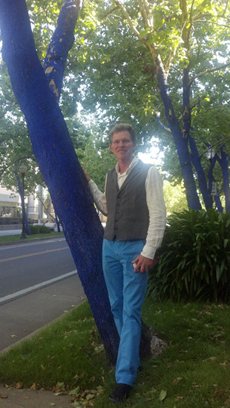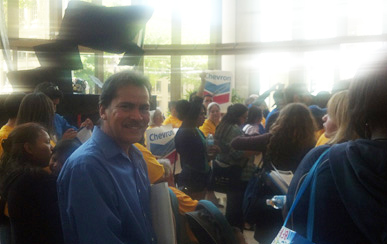 CFT Lobby Days in Sacramento:
CFT Lobby Days in Sacramento:
Reflections from a Clueless Art Teacher
By Tobin Keller, Art Department Co-Chair
On Monday morning, April 28th, Maya Bendotoff and I set out to catch the Amtrak train to Sacramento for my very first Lobby Days experience. What are Lobby Days? In the words of the CFT – “Lobby Days provides you an opportunity to meet with state legislators one-on-one.” Various California unions schedule days for their members to listen to and meet with legislators. The CFT organizes all details for the attending members and schedules the meetings with select Assembly members and Senators. Without a clue as to what to expect, Maya and I had a very relaxing and productive three-hour train ride from downtown San Jose. This luxury of time allowed us to brief each other on our Repeatability Resolution tactics and catch up on our countless emails. Being clueless can be forgiven sometimes, like wearing white open-toe shoes after Labor Day, but it left me ill-prepared for what was really going to happen on Tuesday, April 29th, The Day.
We arrived downtown and checked into the Sheraton Grand Hotel, which is a very comfortable renovated building that is close to the State Capital. All members had to check in and assemble for the 5:30 dinner, which was followed by a talk by California Insurance Commissioner, Dave Jones, and then New Members Orientation Issues Training. I made it through dinner, didn’t know many other members and so became very familiar with the dessert buffet, as it seemed to be a social hub. The orientation was fast and still left me wondering what was happening. We were asked to become familiar with the current Assembly and Senate Bills sponsored and supported by the CFT. I was good with this—after all, I should know about anything the CFT is sponsoring. But what about our Repeatability Resolution adopted at the convention in March? It wasn’t listed in any of the provided materials. It was announced that members would be divided into groups with a team leader guiding each group to appointments with select legislators. Maya voiced our concerns to our group’s team leader, and it was decided that I would work the Repeatability Resolution into the dialog during the meetings. Each of the six members of our group was tasked to present one bill in three minutes. Okay, now I had a tiny clue as to what was happening but I had homework to do.
Tuesday at eight a.m. came and went. I was supposed to be in front of the Capital building for a group photo but slept through my alarm. I didn’t think this was such a bad thing, but I did miss our first group meeting. This would have given me the opportunity to organize and practice my three minutes of Repeatability Resolution defense. I did make it to the Governor’s Council Room and to the discussion sessions with legislators serving mostly on education committees. This gave us an opportunity to hear their points of view on education and to ask questions. This was useful, especially since I was able to meet the legislators in the lobby afterwards. The scheduled closed-door group meetings were very different: staffers conducted all three that I attended. I was once told that it could be better to meet with a staffer than the legislator to get on the agenda. This may be so, but I felt my two-minute “run ins” with the legislators were more useful, and I was able to directly hand them my Repeatability Resolution packet.
What was my overall impression of Lobby Days? I felt it was useful, mostly. Meeting members from other local unions was important. It was also helpful to listen to the variety of Senators and Assembly  members, ask them questions, and then scurry after them to give each my information. I felt honored to represent Cabrillo College. And even though I was initially clueless about how the CFT Lobby Days worked, I was informed and passionate about our Repeatability Resolution and why it’s not a good thing for Community College students. Being clueless may be forgiven sometimes, but I sure wish I hadn’t been when Michele Rivard was sounding the warning bell three years ago. She pointed out the impact that repeatability restrictions would have on the arts and attempted, as one of the resolution task force members, to soften the blow by insisting on allowing for the leveling of courses. Would I participate in Lobby Days again? Yes. But next time I will insist that other members join us. Having a larger contingent from Cabrillo will make a difference in whatever we are trying to accomplish. And besides how can you pass up a three-hour train ride with Maya Bendotoff?
members, ask them questions, and then scurry after them to give each my information. I felt honored to represent Cabrillo College. And even though I was initially clueless about how the CFT Lobby Days worked, I was informed and passionate about our Repeatability Resolution and why it’s not a good thing for Community College students. Being clueless may be forgiven sometimes, but I sure wish I hadn’t been when Michele Rivard was sounding the warning bell three years ago. She pointed out the impact that repeatability restrictions would have on the arts and attempted, as one of the resolution task force members, to soften the blow by insisting on allowing for the leveling of courses. Would I participate in Lobby Days again? Yes. But next time I will insist that other members join us. Having a larger contingent from Cabrillo will make a difference in whatever we are trying to accomplish. And besides how can you pass up a three-hour train ride with Maya Bendotoff?
PVFT President Francisco Rodriguez and other CFT members
at an oil extraction tax protest at the Chevron Building in Sacramento
(lunch action for Lobby Day)
CFT Lobby Days Legislative Priorities(April 29, 2014)
|
